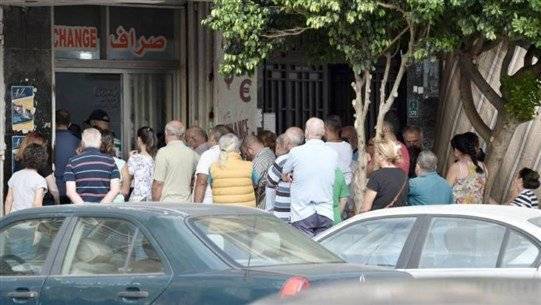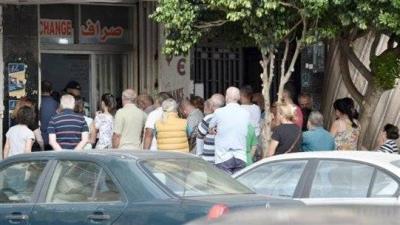The dollar's exchange rate smoothly surpassed the 40,000 Lebanese pounds threshold, solidifying its daily increases tirelessly, amidst a lack of clarity regarding the possibility of forming a new government and a deadlock in electing a new president. It recorded yesterday 40,400 pounds due to the increasing demand for it, necessary for importing fuel and medicines... and due to the lack of intervention from the Central Bank of Lebanon to lower the rate, as well as the smuggling of quantities to abroad, according to sources for "Nidaa Al-Watan."
Automated teller machines have witnessed a heavy influx over the past two days, following the disbursement of social assistance for the month of September, which is equivalent to a month’s salary for public employees, retirees, and military personnel. This led to long lines of people in front of exchange offices to cash their salaries withdrawn in dollars according to the "Sayrafa" platform rate of 30,100 Lebanese pounds. A salary of 3 million pounds is worth about 100 dollars at the "Sayrafa" rate, compared to what it would be valued at around 4 million pounds in the black market.
This scene occurs while banks remain closed, and some of them are providing the "Sayrafa $400" service, which is still available for their customers, under the pretext of preparing their automated teller machines to facilitate deposits in Lebanese pounds and allowing cash withdrawals of 400 dollars without entering the bank. It is noteworthy that other banks have completely halted this service, citing the closures, while maintaining salary withdrawals via ATMs as a priority.
Regarding discussions among the authorities and allied circles about the continued rise of the dollar's exchange rate until the end of the presidential term, financial advisor Ghassan Shamas told "Nidaa Al-Watan" that "the reason is not political, as positive shocks no longer affect the dollar in the long term; it is confined to supply and demand, and the Lebanese market is 'narrow,' meaning that if someone requests a large amount of dollars, they acquire it from multiple exchangers, thus reducing the overall supply in the black market, leading to an increase in the dollar exchange rate."
Interestingly, the reserves of the Central Bank of Lebanon, which reached 9.5 billion dollars, increased by 450 million dollars over the month from mid-September to mid-October. The source of this increase is reportedly due to remittances coming into the country and the "central bank" buying dollars from them at the market rate, to also cover most of the transactions on the "Sayrafa" platform and pay the salaries of public sector employees and military personnel, transportation allowances, and state expenses in dollars for ambassadors, consuls, and economic attachés, as well as for fuel supplies for security forces and the army, in addition to supporting wheat and medicines.




